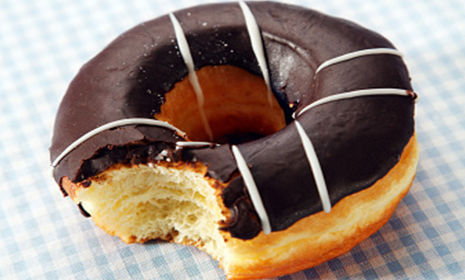
In our continuing series about the psychology of food and eating, we look at issues of guilt and denlal.
At Enjoy Food this month, we've been focusing on baking and buying treats but, as we all know, after having a treat you can find yourself with an unexpected and 'not-so-sweet' aftertaste... guilt.
The healthy eating advice for people with diabetes is that you're free to enjoy all types of foods. This means eating healthier foods such as fruits, vegetables, pulses, oily fish and wholegrains more often and having highly processed foods that are high fat or high sugar, only in moderation. But there can be times when navigating this 'freedom' can be easier said than done.
Guilt, denial and eating
That guilty feeling of ‘should I or shouldn’t I?’ can be an unwanted part of following this health advice, because the freedom can cause consequences that are hard to ignore – whether it’s higher blood glucose results, or a couple of pounds on the bathroom scales. Guilt can be part and parcel of life with diabetes.
But did you know there is a psychological reason why ‘everything in moderation’ can be such helpful advice for those living with diabetes? Because without it, in our food abundant world, we can feel like we are in a permanent state of denial. Denial is the state of refusing something we desire, and it’s part of human nature to want the things we deny ourselves even more. Saying no to what we want time after time can wind us up like a tightly coiled spring. That first bite into a food that we have been denying ourselves can bring a sense of freedom, and like a newly released spring, it’s often followed by, ‘Well now I’ve blown it, I’m really going to go for it!’ and eat everything in sight. This can lead to a ‘binge hangover’ – where it’s difficult to let the decisions of yesterday go, the sense of failure and hopelessness persists into the next day and we continue to eat in a way that’s out of control.
Managing your eating
If you’re someone who struggles with guilt, denial and ‘letting yesterday go’, here are some ways to help you think about managing it differently:
- When you are eating a food that causes you to feel guilty, make an extra effort to eat it slowly and mindfully. Often, guilty eating causes us to eat more quickly than usual as our minds are focused on the thoughts in our heads rather than the taste in our mouths.
- Try taking smaller bites, feel the texture in your mouth, chew it thoroughly, enjoy it.
- If you’re eating with others, you might want to experiment by sharing the experience by talking about the flavour and taste of the food.
- If you notice yourself getting in a guilty frame of mind, imagine you are talking to a friend – what would you say to him or her? Some examples might be, ‘Don’t worry about it’, ‘Well you enjoyed it’, ‘You can get back on track now’ – without blame or judgment.
- If you’re left with the ‘guilt-hangover’, what choice you can make right now that’s in line with your health goal? Think ‘I’ll take an action to correct this’. If your diabetes is managed with insulin this could be figuring out a correction dose to take, if it’s feeling guilty about your food intake you could take the stairs instead of the lift for the rest of the day, for example, or go for a walk.
Diabetes comes with a range of ‘shoulds’, ‘oughts’ and ‘to-dos’. With all the medical advances in managing it and tracking it, comes the freedom to make the choices that are right for you. So while guilt can be an unwanted side effect of this freedom, don’t ignore it. Let it be a clue that points to something positive. Feel proud of yourself for all your achievements, no matter how small. Diabetes is tough and guilt and denial can make it even tougher. Be kind to yourself and you are much more likely to achieve the health and wellbeing results you’re truly capable of.
